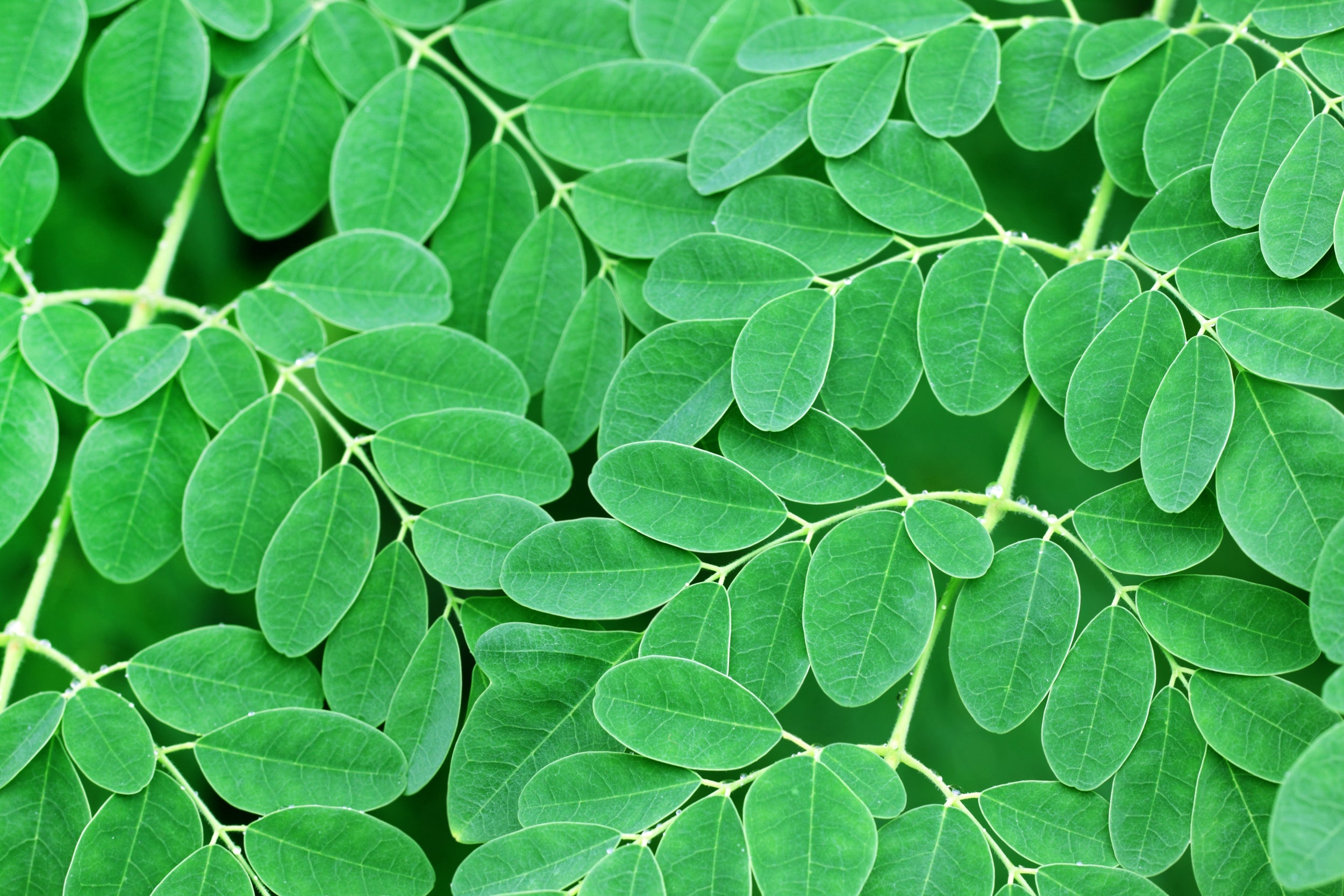
First, it was green tea. Then it was matcha. Now, it seems everyone you know is obsessed with moringa powder. What’s with all these bright green powders and their ability to capture the attention of the wellness community? If you’ve found yourself asking this question, you’ve come to the right place.
Moringa may be the next up in green powder trends, but it’s anything but trendy. In fact, it’s been used for centuries and is trusted in traditional medicine for its ability to help support and nourish the body. It’s a true, undisputable SUPERfood.
Read on to learn more about the magic of moringa and why you’re seeing more of it on store shelves, on social media, and maybe even in your own pantry.

What Is Moringa?
First things first: meet moringa. Moringa is a shrub that is native to parts of eastern Africa and is also grown at the foothills of the Himalayas in India. Moringa is fast-growing and is resistant to drought.
It’s been referred to as the Tree of Life and The Miracle Tree because every single part of it is edible. Not a bad rap for a little shrub.
Historically, the use of moringa dates back centuries. It’s foundational in Ayurvedic medicine, and there’s even evidence it was used by ancient Greek, Roman, and Indian warriors during battle to increase their strength and general indestructibility.
Now, it’s available to you (an equally indestructible force in your own right) in an easy-to-use powder form that requires zero trips to the Himalayas for harvesting. So why should you use it? A better question is, why wouldn’t you?
What Are the Health Benefits of Moringa Powder?
There’s a reason why moringa is miraculous. It contains numerous plant compounds, vitamins, and minerals that your body can use, all wrapped up in one convenient food source.
Here’s a closer look at what’s inside.
Antioxidants
By now, you’ve likely heard that you need antioxidants, but maybe you aren’t sure why. Antioxidants are compounds that can help protect your cells from damage from oxidative stress (otherwise known as free radical damage).
Oxidative stress happens when there’s an imbalance of antioxidants versus free radicals in your body. That’s important because when oxidative stress occurs, it can lead to everything from premature aging to disease.
Your body creates free radicals as a result of normal metabolic processes, as well as when you’re exposed to external stressors like UV rays, cigarette smoke, and pollution. Basically, you’re exposed all the time. Antioxidants help shield your cells from these aggressors, and moringa contains a mountain of them.
These include:
- Vitamin C
- Beta-carotene
- Quercetin
- Chlorogenic acid
Making moringa part of your morning routine is as essential to your skincare regimen as your eye cream.
Healthy Heart and Blood Sugar Support
Because of the antioxidant load in moringa, it’s been used as a natural way to support heart and blood sugar health. In addition to the antioxidants, it’s also rich in fiber.
Consuming products that contain fiber can also support blood sugar levels, helping you avoid that blood sugar spike-and-crash scenario that happens when you eat something high in refined sugar (like pastries) or something void of protein and healthy fats (such as bagels, oatmeal or fruit-only smoothies). (It’s also why eating whole fruit, like an orange, has a very different effect on your blood sugar than drinking a glass of fiber-free fruit juice.) Not to mention, fiber is essential for proper digestion and can help protect and support your entire digestive tract.
The plant compounds in moringa are so powerful that they’ve even been shown to help support the immune system and protect healthy cells.

Nutrient Dense
What makes a superfood a superfood? Its nutrient content. Whole foods that have been minimally processed tend to contain more nutrients (protein, fats, carbohydrates, vitamins, and minerals) than foods that have been heavily processed, and superfoods are particularly packed with nutrients.
Moringa’s superpowers lie in its nutrient-dense leaves. They contain all nine essential amino acids, making them a complete protein. They also contain iron, calcium, potassium, zinc, and magnesium. In fact, they contain over 90 nutritional compounds!
Making moringa powder part of your daily diet can help you fill in nutritional gaps and ensure you’re checking all those vitamin and mineral boxes.
Neuroprotective Properties
Lacking focus and feeling foggy-headed is usually what drives us straight to the coffee maker (or the Starbucks line) each morning. The problem is that coffee is a stimulant that creates a false sense of energy by blocking our sleep-promoting receptors, while leading to a vicious caffeine dependency cycle.
Moringa (by itself) doesn’t contain caffeine, but research suggests that it boasts neuroprotective qualities, plus, it contains vitamins that are essential for energy production and B vitamins, which support long-term energy supplies.
Making the move to moringa could help you regain a cleaner, more consistent level of energy and help you focus more throughout your day.
How Can You Use Moringa Powder?
Adding moringa to your day-to-day meal prep is easy. Here are four easy ways to add moringa powder to your daily routine.
Blend It Into Breakfast Smoothies
Slip more nutrition into your smoothie by adding moringa powder. JOYÀ’s Focus Matcha Superblend contains moringa powder along with ceremonial grade matcha, lion’s mane, and ashwagandha to completely maximize your mornings.
You can easily add our Focus Matcha Superblend to any smoothie recipe you love, but if you need fresh ideas, say no more. Check out our six smoothie recipes containing whole-food ingredients that are both nutrient-dense and flavorful. They’re easy to make, require only a few ingredients, and give you the moringa you want in a delicious, nutrient-dense package.

Add It to Soups and Stews
Most moringa powders have a very subtle, earthy taste. Adding a teaspoon to a soup or stew will likely be undetectable and is an easy way to add a little moringa into your diet. Try removing a cup of prepared soup or stew from your dish and blending it with moringa powder before adding it back in to ensure it mixes smoothly.
Whip Up a Nutritious Sauce or Dressing
Because moringa powder has a light flavor, it also works great when whisked into salad dressings and marinades. You don’t even need to make your own. Simply add a teaspoon of moringa powder to your existing salad dressing or marinade and drizzle on your food.

Make Moringa Milk or a Superfood Latte
Level up your latte by swapping out your morning coffee for this Brain Loving Iced Matcha Latte. This recipe combines the Focus Matcha Superblend with non-dairy milk (try coconut milk for a rich, creamy texture and a bit of natural sweetness) to make a delicious coffee alternative.
If you’re using plain moringa powder, you can easily make moringa milk by steaming your milk (try one minute in the microwave) and using a frother to blend your powder into the milk. Top with cinnamon or nutmeg and a drizzle of honey.
When Should You Take Moringa Powder?
The time you consume your moringa powder isn’t as important as how often you use it. The benefits of moringa come when it’s used over a period of time. You won’t feel an instant jolt when you use moringa powder — instead, you’re more likely to notice a higher level of energy, focus, and concentration over time.
To encourage consistency, use moringa when it makes the most sense for your schedule. For instance, if you love breakfast smoothies, blend your moringa powder into them in the mornings. If you’re more of a soup and salad person, add your moringa powder in at lunchtime.
JOYÀ’s Focus Matcha Superblend contains caffeine (from matcha), so using it in the later afternoon or evening might not be the best option. Instead, opt for adding Focus to your morning and midday meals and snacks.
Keep in mind that if your moringa powder is blended with other ingredients (like caffeine), it may be best to take it in the morning.
The Bottom Line
The moral of the moringa story? Use it consistently, as much as every day. The benefits of adding moringa to your day are numerous, making this little green powder a powerhouse of nutrition and wellness benefits.
Want more from your moringa? We’ve got you covered. JOYÀ’s Focus Matcha Superblend contains moringa along with adaptogenic ashwagandha, alert-calm promoting matcha, immune-supportive lion’s mane, and nutrient-dense pine pollen. Adding a scoop to your day is an easy way to level up your nutrition and grab loads of moringa benefits.
